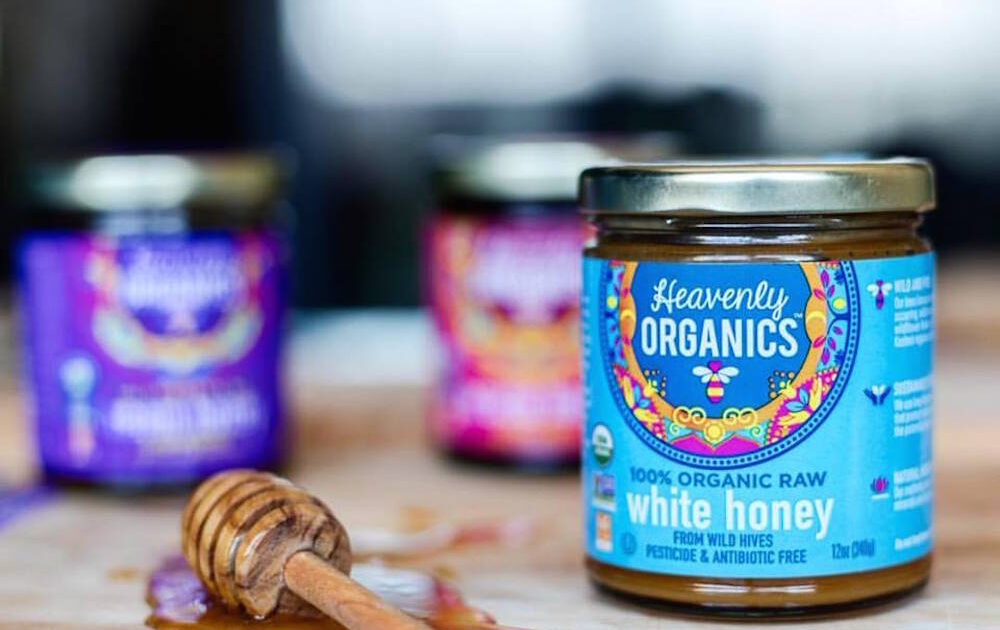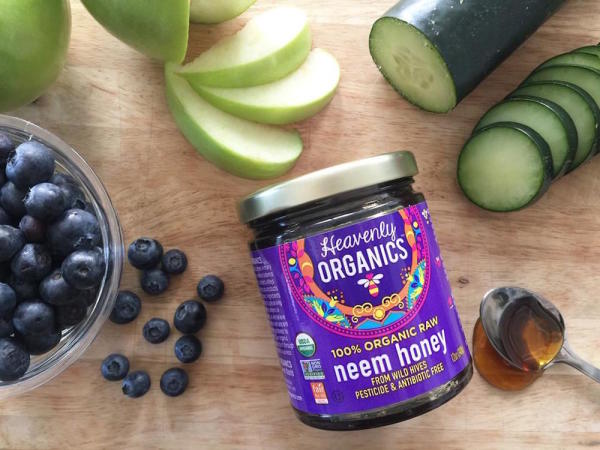Heavenly Organics is Bringing Jobs to Conflict Zones (and Producing Glyphosate-Free Honey in the Process)

Last year, the FDA found that most U.S. honey contains glyphosate, the active ingredient in Monsanto’s Roundup herbicide, but Heavenly Organics honey is one that you can be sure isn’t tainted.
How can we be certain? Not only has Heavenly Organics been tested and approved by the Detox Project, a company that tests products for the presence of the chemical, but this honey is also sourced from a remote Indian jungle where no glyphosate – or any other contaminants – can get to it.
A Honey Company with an Ethical Mission
Heavenly Organics was founded in 2005 by Amit Hooda, who grew up in central India during the Punjab insurgency. He was looking for a project to help people in conflict areas earn a living, and along with his agronomist father, Dr. I.S. Hooda, he found a way: harvesting wild honey from central Indian jungles.
While locals have long collected this honey by removing the natural hives from trees – or chopping down the trees entirely – the Hooda family developed a new, more sustainable way to harvest the resource.
“We train local men to climb up and slice away just a part of the hive, in a way that leaves the queen bee undisturbed,” explains Jason Jones, President of Heavenly Organics. “That allows the hive to regenerate.”
Often, the wives of trained honey collectors are taught to purify the honey at home, doubling the ability of families to thrive and eke out a living. In essence, Heavenly Organics has created a sustainable, renewable industry in this remote region of India, affording nearly 600 families the ability to earn a living close to home.
“They are our production team, effectively,” says Jones of these local workers. “And they’re part of our family.”
A Truly Pure Product
Choosing a remote conflict zone for the harvest of this honey is beneficial in a myriad of ways. Not only does the company create a host of jobs for locals that were sorely in ned of them, but by virtue of the source of this honey, it is completely devoid of any contaminants with which it would come into contact if it were made in a more agriculturally developed part of the world, including glyphosate.
Glyphosate is omnipresent in our food today. Not only have internal FDA e-mails revealed that most honey samples contain at least some glyphosate, even “organic mountain honey,” but glyphosate has been found in everything from breakfast cereal to baby food.
Usually used as an herbicide on crops that have been genetically modified to withstand the chemical, glyphosate is now present in far more than just these GMO corn and soy strains. Pesticide drift compounded with the practice of using glyphosate to dry out certain non-GMO cereal crops before harvest means that even some non-GMO and organic foods have become contaminated with the chemical.
“Unfortunately, this is just what we’ve done to ourselves through industrial agriculture,” says Jones. “It’s the pervasiveness of large monoculture crops.”
With honey, however, it’s even more difficult to eradicate glyphosate.
“Bees are not living in a barn, and you can’t keep them in a cage,” explains Jones, who notes that not only do the pollinators have a range of several miles, but often, they are pollinating right after pesticides have been applied to local crops.
“So it’s actually a worst-case scenario,” he says. “They’ve dumped chemicals on their crops right before the bees visit during the pollination process, and then they bring that back to the hive, which in turn comes into our kitchens and into our bodies and into our children.”
Because Heavenly Organics honey is sourced from such a remote location, there is no risk of contamination and thus the product that is produced is pure. The company confirms this promise not only through the Detox Project certification, but also through what Jones calls “a great battery if internal tests” targeting not just glyphosate but other common contaminants as well.

Discovering the Heavenly Organics Product Line
Heavenly Organics currently produces three wild honeys from northern and central India.
The white all-flower honey is made by wild bees foraging in the wildflower fields of the Gangotri, Jammu and Kashmir regions of the Himalayan Mountains. This, Jones notes, is the lightest, creamiest, and thickest of the company’s honeys, with a spreadable texture and an exotic floral aroma.
The company also produces two single-varietal honeys: the acacia honey boasts a delicate fruity taste and a mildly tangy finish and, Jones notes, is a frequent favorite. But perhaps even more special and intriguing is the Neem honey, made from the flowers of the Neem tree, which has been used in traditional Ayurvedic medicine for centuries.
Neem is known for its antibacterial and digestive health properties, benefits that appear in the honey as well.
“It’s very similar to a Manuka honey,” explains Jones, who notes that the honey also has a unique flavor: rich, dark, and robust, it evokes notes of molasses and is great for marinades.
In addition to these three honeys, Heavenly Organic produces organic whole cane sugar made by a small cooperative of family farmers from the foothills of the Himalayas with minimal processing, as well as dairy-free chocolate honey patties, which Jones calls “the peppermint patty that you always should have been eating.”
The patties are made with a 100 percent cacao shell and filled with the company’s raw white honey. They’re a favorite amongst proponents of the paleo diet as a sweet treat that has all the benefits of its two main functional food ingredients.
The Future of Heavenly Organics
Heavenly Organics continues to grow with its ethical vision in mind. Currently, the company envisions increasing the number of farmers it works with to 5,000 in the next five years.
Jones notes he also hopes to extend this business model to other conflict zones, proposing other products from around the globe and creating more ethical, sustainable jobs in a variety of regions.
“The whole reason for creating the company was in order to produce a stable economic opportunity for folks where there wasn’t one,” says Jones. “Those people are often forgotten, and they need help. The fact is, there are a lot of wonderful agricultural products that we can tap into in places like this and genuinely make the world better in doing it.”
Related on Organic Authority
How It’s Made: MightyVine is Bringing Fresh, Local Tomatoes to Chicago 365 Days a Year
How It’s Made: Clover Sonoma, A Pioneer of Clean, Sustainable Organic Milk
How It’s Made: The Maple Guild’s Mapliest Organic Maple Syrup (and More Maple!)

